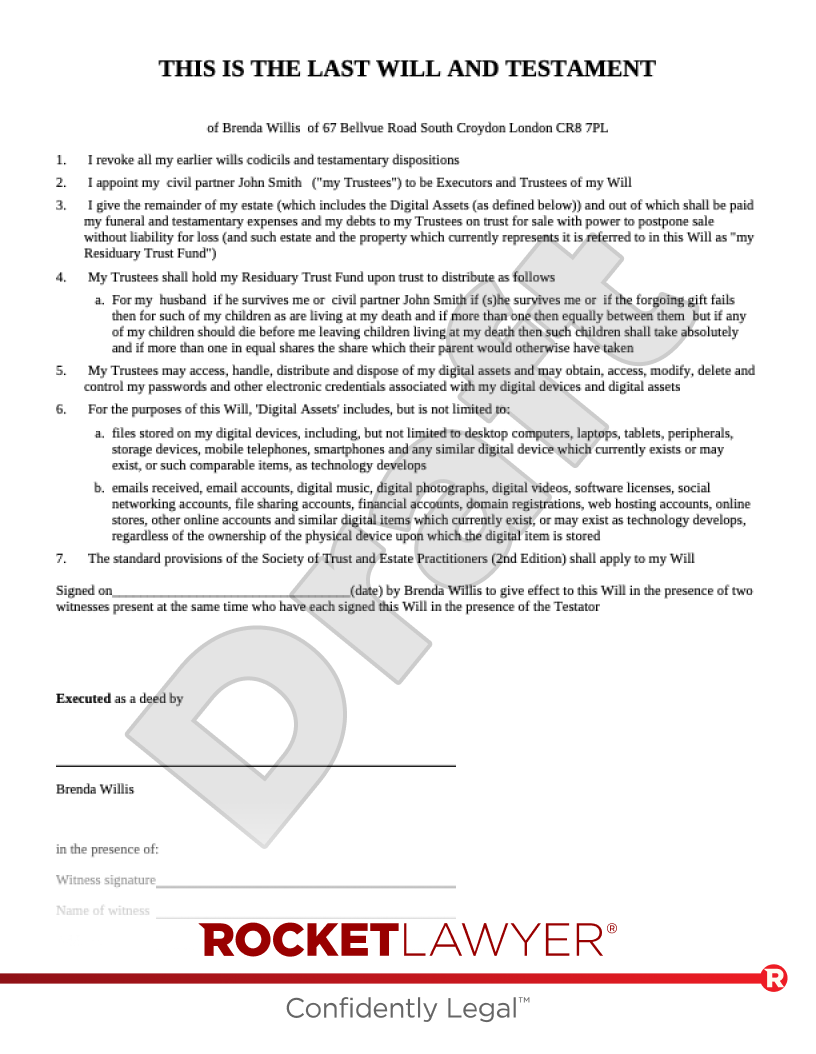What are the best ways to store a will?
There are different ways to store your will, including:
Storing your will with solicitors
If a solicitor has written a will, they will normally be able to store the original. This is generally part of their will-writing package, although it is worth checking if storage involves an additional fee. DIY wills (eg the Last will and testament for England and Wales and the Last will and testament for Scotland provided by Rocket Lawyer) can also be stored by a solicitor, but this will normally incur a fee.
Storing your will with will writing services
There are various businesses offering will creation services (eg Co-op and Trust Inheritance) which additionally provide storage facilities. But unlike solicitors, will-writing services are not all regulated. As a result, it is important to keep a backup copy just in case.
Storing your will with HM Courts and Tribunals Service (HMCTS)
In England and Wales, wills can be stored with the probate registry within the courts (ie HMCTS) for a one-off fee of £22. This is a formal process that requires a form to be sent by post using a safe custody envelope pack.
Any changes to a will also need to be submitted to the Probate Service via a Codicil.
See the government’s guidance for more information.
Storing your will with banks
Some banks offer will-writing and storage services. However, wills stored in a bank should be accessible to executors. As a result, safety deposit boxes are generally not suitable (see below for more information). Banks in Scotland may charge an annual fee for this.
Keeping it yourself
This is the cheapest and easiest solution - but it's also the riskiest. If your home experiences a fire, flood or burglary, you risk losing your will. If your will is missing or damaged in any way (eg ripped), the courts may consider it invalid. An invalid will means that your belongings would be distributed according to the intestacy rules.
If storing a will at home, make sure the location is secure and known to executors.
Where should you not store a will?
As a general rule, wills should not be stored in bank safety deposit boxes. These will not normally be accessible to executors until probate has been granted, and probate cannot be granted until the will has been obtained.
Similarly, any home-based safes or locked locations should be accessible to executors.
What should you bear in mind when storing your will?
There are numerous things you should consider when storing your will, including the following:
-
leave clear instructions about where your will can be found. It is vital that your executor knows where your will is and how to retrieve it. Tell your executors in advance where you are storing your will, and whenever something changes
-
take precautions against physical damage to your will (eg from fire or flood damage)
-
don’t make changes to your original will (eg by striking out names or changing gifts). If a will shows signs of being tampered with, it may call into question the entire contents of a will (eg because it may look like the will, or parts of it, were forged)
-
take care not to attach anything to your will (eg with paper clips or staples). If they detach and leave marks, this may raise doubt about whether your will is missing any parts or amendments, and it may be deemed invalid
-
consider registering your will with the National Will Register. This ensures that its existence and location are recorded so that executors and other relevant parties are able to find it
For more information on wills and ensuring that they are valid, read Making your will and Executing a will.




